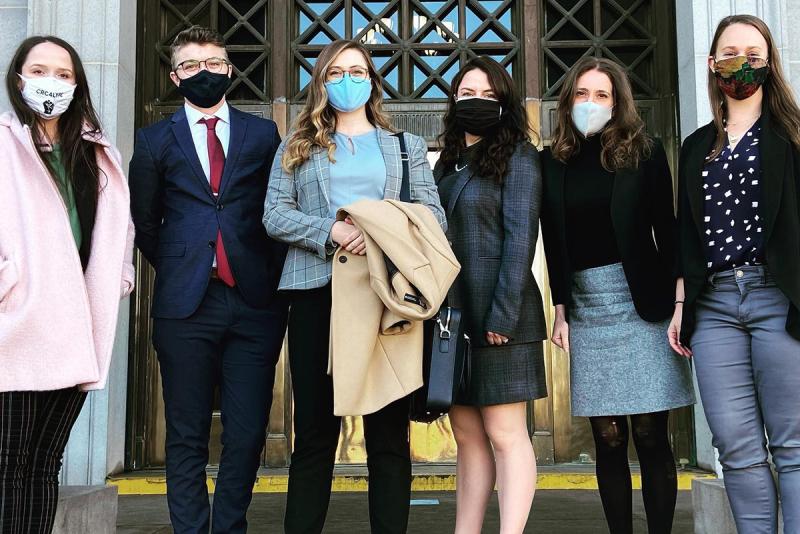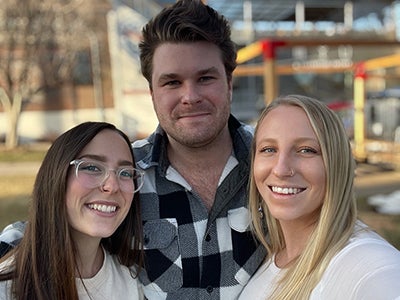Civil Rights Clinic 2021 Highlights

Civil Rights Clinic student attorneys (l-r) Julieanne Buchanan, Aaron Baker, Kelsey Martin with co-counsel Anna Holland Edwards, Erica Grossman, and Rachel Kennedy (CRC Student Attorney ’17-’18) after the final fairness hearing in Winston v. Polis.
Civil Rights Clinic 2021 Highlights
Civil Rights Clinic (CRC) student attorneys at the Sturm College of Law remain focused on vigorously defending the rights of incarcerated people. In Fall 2020, student attorneys Miriam Kerler, Elisabeth Teater, and Kevin Whitfield engaged in discovery in a case challenging the federal government’s placement of a man with mental illness and intellectual disability in indefinite solitary confinement at the federal supermax prison. The students propounded written discovery requests, conferred on discovery disputes with their opposing counsel in the United States Attorney’s Office, and worked with expert witnesses to further the representation. After making expert disclosures, the student team learned that the Federal Bureau of Prisons would be transferring their client to a mental health program in another prison. On the students’ last day enrolled in the CRC, they learned that the client had successfully been transferred to the mental health program. The current student team is awaiting final judgment and determining next steps in the case.
In December 2020, the United States Supreme Court announced its decision in Tanzin v. Tanvir, which resolved the question of whether the Religious Freedom Restoration Act (RFRA) authorizes monetary relief against individual government officials for statutory violations of the statute. The Supreme Court’s decision prompted the Tenth Circuit to lift the stay on an appeal filed by CRC student attorneys in 2019. The appeal presented two questions: (1) whether RFRA authorizes a damages remedy against individual defendants and (2) whether the district court erred in determining that an aspect of a CRC client’s claim was moot just prior to trial. In January 2021, student attorneys Katie Heideman, Hunter Ross, and Z filed a supplemental brief, arguing that Tanzin definitively answered the first question in the affirmative. The students also argued that under the Supreme Court’s rationale in Tanzin, qualified immunity should not be an available defense under RFRA. After the government defendants filed their answer brief, the students filed a reply brief at the end of the Spring 2021 semester. The case is now set for oral argument in November 2021. Student attorney Julieanne Buchanan will argue the appeal, and her colleagues Genna Carver and Kendrick Davis have been assisting her preparations, including filing a letter of supplemental authority under Federal Rule of Appellate Procedure 28(j).
Throughout the 2020-21 academic year, the CRC continued its representation of amici curiae in federal appeals throughout the country. Student attorneys Katie Heideman, Hunter Ross, a Z worked on a brief in the Fifth Circuit focused on presenting the courts with evidence that the use of solitary confinement makes prisons more dangerous, and its elimination improves safety. Student attorneys Annika Adams, Tempest Cantrell, Sue Rogers, and Kensye Wood worked with Lambda Legal on a brief in the Tenth Circuit in support of an incarcerated transgender woman seeking a Bivens remedy for violations of her Eighth Amendment rights. The CRC’s amicus work continues this semester, with student attorneys Tempest Cantrell, Chris Nafekh, and Katie Scruggs filing a brief in the Third Circuit in September 2021 and student attorneys Molly O’Hara, Jamie Ray, and Kevin Whitfield filing a brief in the Fourth Circuit in October 2021. For both briefs, the CRC represented a group of corrections experts seeking to provide the courts information about alternatives to solitary confinement.
In March 2021, the CRC, along with the Civil Rights Education and Enforcement Center (CREEC), filed a complaint on behalf of Disability Law Colorado (DLC) in federal district court in Colorado. In the lawsuit, DLC asserts associational standing on behalf of a group of deaf and hard of hearing people incarcerated in the Colorado Department of Corrections (CDOC). The case seeks injunctive relief requiring CDOC to provide effective communication to all deaf and hard of hearing people in its custody. Student attorneys Stephanie Frisinger, Tom Ford, and Kassidy Roberts drafted the complaint and conducted the initial discovery planning conference. Current student attorneys Anna Goebel, Kassidy Roberts, Jennifer Tuttle, and Hannah Williams are engaging in discovery and working with expert witnesses throughout the Fall 2021 semester.
Finally, in May 2020, the CRC joined a coalition of local civil rights firms and the American Civil Liberties Union of Colorado to co-counsel Winston v. Polis, a putative class action suit seeking to protect medically vulnerable people who are incarcerated in Colorado’s prison system and are severely at risk because of the COVID-19 pandemic. The case was filed against the governor and the executive director of CDOC. The case against the executive director settled, and, in February 2021, student attorney Kelsey Martin along with co-counsel conducted a final fairness hearing, after which the court approved the class action settlement. Student attorneys Aaron Baker, Julieanne Buchanan, and Kelsey Martin, along with their co-counsel, were finalists for the 2021 Trial Lawyer of the Year award from the Colorado Trial Lawyers Association.
CRC Faculty Highlights
Visiting Professor Nicole Godfrey
Publications
- Creating Cautionary Tales: Institutional, Judicial, and Societal Indifference to the Lives of Incarcerated Individuals, 74 Ark. L. Rev. ___ (forthcoming 2021).
- Covid-19 in American Prisons: Solitary Confinement is Not the Solution (with Laura L. Rovner), 2 Ariz. St. L. J. Online 127 (2020).
Presentations
- Panelist, “Impact of COVID-19 in Detention Centers,” DU Civil Rights Summit: We Shall Overcome, (online) (March 6, 2021).
- Panelist, “Institutionalization Roundtable,” Paper: Covid-19 in American Prisons: Solitary Confinement is Not the Solution, Arizona State Law Journal Online Symposium with the Academy for Justice: COVID-19 and Vulnerable Populations (online) (December 14, 2020).
Awards and Honors
- Case of the Year Finalist, Winston v. Polis, Colorado Trial Lawyers Association (2021).
- Faculty Career Champion Nominee, University of Denver (2020, 2021).
Professor Laura Rovner
Publications
- “Litigating for Better Medical Care,” in Public Health Behind Bars – From Prisons to Communities (with Rhonda Brownstein) (Robert B. Greifinger, ed.) (Springer Books 2021).
- COVID-19 in American Prisons: Solitary Confinement is Not the Solution (with Nicole Godfrey), 2 Ariz. St. L.J. Online 127 (2020).
Presentations
- Hearing on CO HB 21-1211: Regulation of Restrictive Housing in Colorado Jails, testimony before the Colorado House Judiciary Committee (April 6, 2021), testimony before the Colorado Senate Judiciary Committee (May 6, 2021).
- Panelist, “Constitutional Litigation Against Solitary Confinement,” Strategies to Combat U.S. Solitary Confinement: Domestic and International Legal Approaches,” American University International Human Rights Law Clinic Symposium (April 2021).
- Panelist, “When the Walls Have Ears: Government Surveillance in the Course of Client Representation,” Journal of the Legal Profession Symposium: What Do You Do When the Man’s Spying on You—The Intersection of Government Surveillance and Legal Advocacy, University of Alabama School of Law (via Zoom) (March 2021).
- Panelist, “COVID-19 in American Prisons: Solitary Confinement Is Not the Solution,” Arizona State Law Journal Online: Virtual Symposium on COVID-19 and Vulnerable Populations (December 2020).



